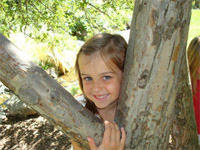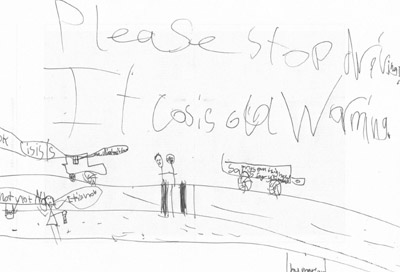In England they start kids off on an activist career very young, it seems.
 By the summer of 2007, my oldest was a six year old tree hugger, as evidenced by this picture. After only half a year at her English primary school, she was regularly lecturing us that driving is bad for the environment (even though we hardly ever drive — we take public transportation to drop her off and pick her up from school).
By the summer of 2007, my oldest was a six year old tree hugger, as evidenced by this picture. After only half a year at her English primary school, she was regularly lecturing us that driving is bad for the environment (even though we hardly ever drive — we take public transportation to drop her off and pick her up from school).
Occasionally my wife has been known to do the unthinkable for this young activist: she shows up in the car to pick her up from school if it is pouring rain at the time school is ending. The truth is, most of the time she goes on the bus with our two year old to pick up the older girls from school, even when it’s raining. But every once in a while, it just works better to pick her up in the car. On one such occasion, I am told that our little activist disappeared up into her room that afternoon and emerged with this stern reminder for what she apparently considers to be her oafish parents:

I am proud that my daughter is so interested in this, particularly since I am on board with the impulse to drive less. My sense is that Mormons ought to be acutely aware of proper stewardship of and responsibility for the cleanliness and general health and well being of the planet (we need look no further than the Doctrine and Covenants to find encouragement in this regard). Pollution of our environment, whether of the air, land, or water, or the derivative endangerment or extinction of species should concern us greatly and be condemned roundly as very bad things in themselves (i.e., outside of a political context).
At the same time, however, I wonder whether political lessons are appropriate for the very young. As we all know, kids’ minds at this age are very impressionable. In this case, the fact that my daughter has been turned into something of a mini-activist by her school lessons isn’t a big deal because care for the environment is an issue I happen to agree with. (Of course, it appears from the way that my daughter is expressing her concern for the environment that it might be the politicized face of the issue of a clean environment that is being taught at my daughter’s school, which I think is too bad.) The risk, of course, is that at some point the kids might come home as activists for causes that you find morally reprehensible. I would imagine at that point that it transitions from being cute to distressing.
This is all the more reason to make sure that the home is a refuge from the world and a place where values and priorities are discussed openly and early. Perhaps a good start is to teach kids early on to recognize the use of important issues for political means and distinguish that from the issues themselves. Hopefully, we all want our children to be able to decide their own politics for themselves based on issues. A home focused on values and priorities can be a rich foundation for a child’s own exploration of political issues as he or she grows up and begins to become aware of how those issues are used — and whether such uses are effective, divisive, disingenuous or sincere, etc.

Continue reading at the original source →



